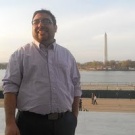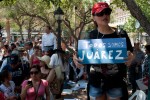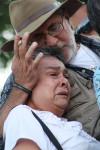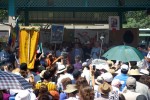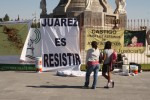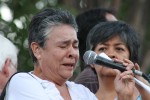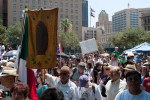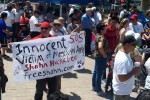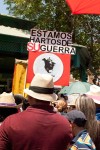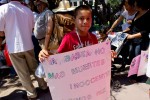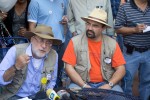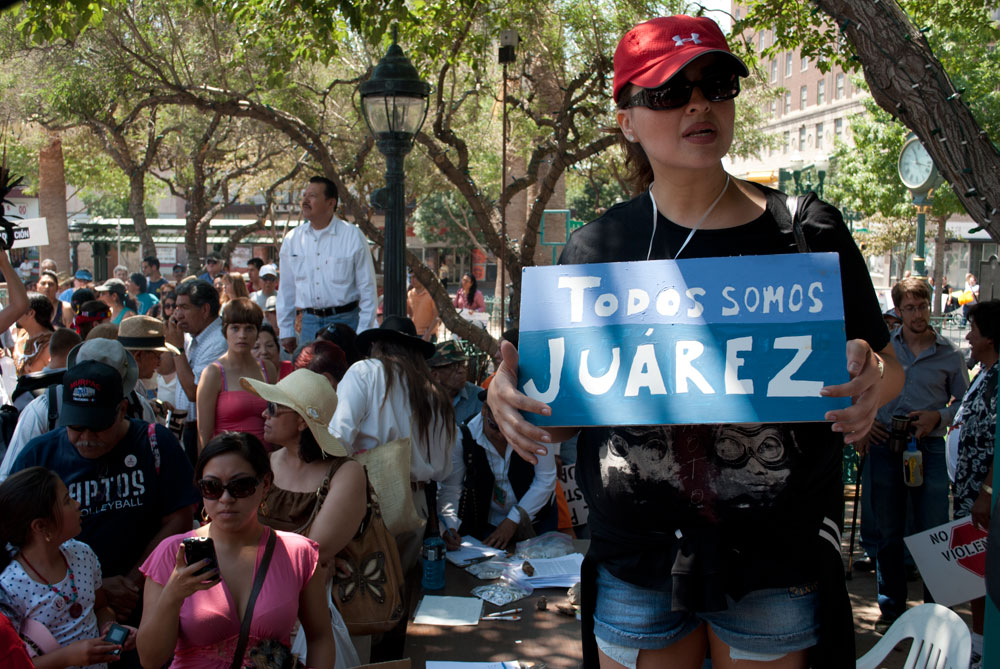
"We all are Juarez" reads a sign at the Caravan for Peace held at San Jacinto Plaza. (David Acosta/Borderzine.com)
EL PASO — The beat of drums and shakers echoed off the buildings of downtown El Paso’s San Jacinto Plaza Saturday as matachines danced and a few hundred persons chanted “¡Juárez, Juárez, no es cuartel! Fuera ejército de él.”
The Caravan for Peace with Justice and Dignity, led by poet and activist Javier Sicilia settled in at the plaza as the poet told a crowd of several hundred about his son’s killing and stressed once again that the drug-war murders in Mexico are non-discriminatory. If something isn’t done to stop the killings, anyone could be a victim, he said.
“It’s a war that no longer distinguishes. Any Mexican can be assassinated, can be a victim of crime or repression,” Sicilia said. His son, Juan Francisco Sicilia Ortega, was found dead in Cuernavaca, Mexico in March, apparently a victim of Mexico’s drug war.
The Caravan for Peace with Justice and Dignity also maintains that Mexican soldiers are guilty of many human rights abuses against Mexican citizens and are complicit in the violence, rather than helping to stop it.
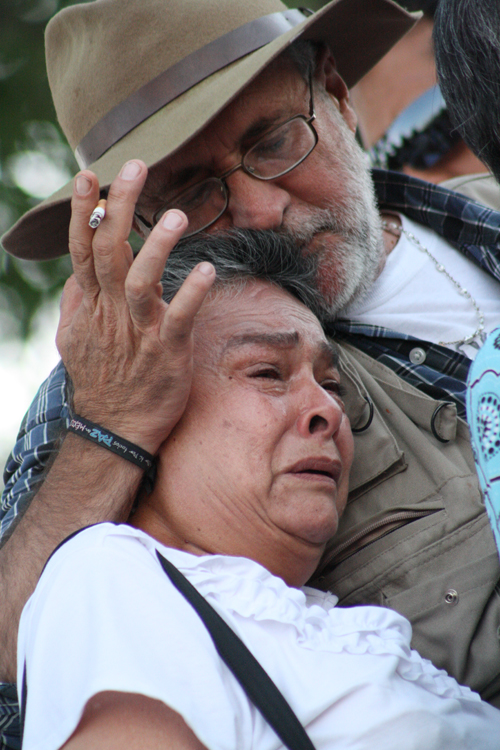
Javier Sicilia comforts Luz María Dávila at the really in Juarez on June 10. Dávila had two sons killed in Villas de Salvacar. (Luis P. Hernández/Borderzine.com)
Sicilia and other activists began their caravan on June 4, traveling through eight Mexican states. The caravan reached Juarez on June 10, where thousands gathered in a similar rally at Benito Juarez Plaza.
“It’s important that Americans recognize that the violations by the Mexican army (against Mexican citizens) are a consequence of the Merida Plan and the U.S.’s strategy,” said Sicilia, speaking at a press conference at Casa Vides in downtown El Paso before the rally.
Sicilia and other activists called on the Mexican and U.S. governments to end the militarization of Mexican cities and work with its citizens to put an end to the violence caused by warring drug cartels.
Members of community organizations and others in attendance were invited to sign the caravan’s Proposal for a National Pact, which presents six demands to the Mexican government. The group is also calling for an end to the Merida Initiative, which provides U.S. military training and funds to the Mexican government in an effort to stop drug violence.
Rosemary Martinez, an El Pasoan who attended the rally, said the connections between El Paso and Juarez are strong. Her family lost a very good friend six months ago, she said. “We have family on both sides of the border. We all run the risk of being the disappeared or the missing, even on this side. It’s just not in the news. It’s important to stand up and quit feeding the money that is supporting the military in Mexico.”
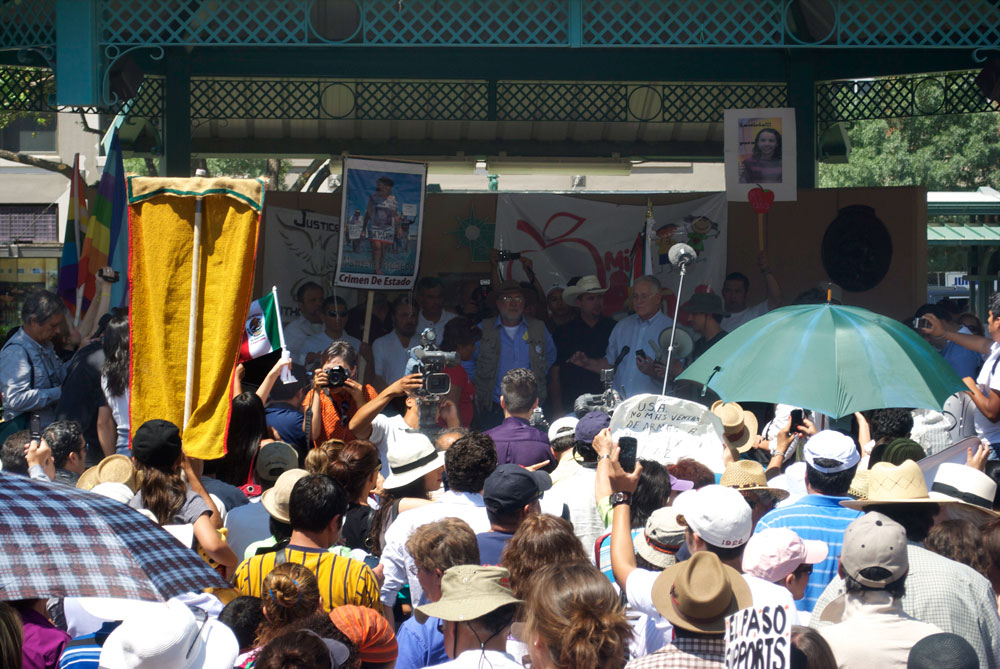
Javier Sicilia speaks at Plaza San Jacinto. (Maria Rubio/Borderzine.com)
The crowd at the plaza quieted as they tried to hear Sicilia speak. Organizers said they had permits to have the city of El Paso turn on electrical outlets in the plaza so that they could have a microphone amplified, however no city official arrived to do so. Speaking into a megaphone, Sicilia urged the crowd not to give up hope.
Celia Aguilar, a student at the University of Texas at El Paso said she saw huge crowds packed into the plaza at the Juarez rally Friday. “Most of them were there because they were directly affected by the violence,” she said. “They had family or friends that had been killed and here we’re just really comfortable and we need to realize what’s going on over there. We need to be involved with helping our sister city.”
- “We all are Juarez” reads a sign at the Caravan for Peace held at San Jacinto Plaza. (David Acosta/Borderzine.com)
- Javier Sicilia comforts Luz María Dávila at the really in Juarez on June 10. Dávila had two sons killed in Villas de Salvacar. (Luis P. Hernández/Borderzine.com))
- Javier Sicilia speaks at Plaza San Jacinto. (Maria Rubio/Borderzine.com)
- Poet Javier Sicilia speaks at a rally in Juarez previous to his visit to El Paso. (Luis P. Hernandez/Borderzine.com)
- The crowd that attended the Caravan for Peace in Juarez was counted in the thousands. (Luis P. Hernandez/Borderzine.com)
- “Juarez is to resist”. (Luis P. Hernandez/Borderzine.com)
- Luz María Dávila tells her testimony at the rally in Juarez. Two of her sons were killed in Villas de Salvacar. (Luis P. Hernandez)
- Juarez. (Luis P. Hernandez/Borderzine.com)
- Javier Sicilia and local organizations’ leaders at a press conference before the rally at San Jacinto Plaza. (Luis P. Hernandez/Borderzine.com)
- The crowd at San Jacinto Plaza was counted in the hundreds. (David Acosta/Borderzine.com)
- Several other human rights organization were also present at San Jacinto Plaza. (Dolores Dorado/Borderzine.com)
- “No more blood”. (Maria Rubio/Borderzine.com)
- (Maria Rubio/Borderzine.com)
- “40 thousand deaths.” (Lourdes Cueva Chacón/Borderzine.com)
- “We are fed up with your war”. (Lourdes Cueva Chacón/Borderzine.com)
- “It’s enough. No more innocents dead.” (Dolores Dorado/Borderzine.com)
- “Justice in Juarez. No more impunity, blood, femenicides.” (Lourdes Cueva Chacón/Borderzine.com)
- (Brendan Johnson/Borderzine.com)
- (Brendan Johnson/Borderzine.com)
- Javier Sicilia and Emilio Alvarez at a press conference after the rally. (Brendan Johnson/Borderzine.com)
